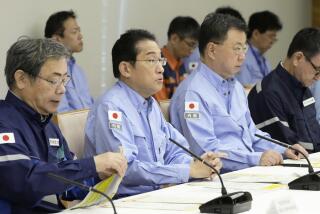Regret, Recognition Key to Events Marking Japan’s WWII Surrender
- Share via
TOKYO — Japanese held two starkly different ceremonies on the anniversary of the nation’s World War II surrender Friday: The government expressed remorse in one, while flag-waving veterans demanded recognition in the other.
How Japan commemorates the day is watched closely by China, South Korea and other countries where anger over Japan’s brutality during the war remains intense.
As in years past, Emperor Akihito presided over a solemn ceremony at Budokan Hall, an auditorium adorned with yellow chrysanthemums. In a somber speech, he expressed “deep sadness” for the lives that were lost in the war.
Prime Minister Ryutaro Hashimoto, wearing mourning clothes, said Japan felt “deep remorse” about the war, but he avoided a direct apology to Japan’s victims.
The war “caused tremendous suffering and sorrow not only in our country but also to peoples of many countries, especially those in Asia,” Hashimoto said.
The noon ceremony coincided with the moment on Aug. 15, 1945, when Akihito’s father, Hirohito, went on the radio to announce that Japan was surrendering.
The prime minister was conspicuously absent from observances held nearby at the Yasukuni Shrine, known as a site of nationalistic and militaristic demonstrations during the war.
Yasukuni, dedicated to the country’s war dead, is controversial because those enshrined there include executed war criminals. Veterans and nationalists rallied at the shrine Friday, urging Japan to recognize the shrine as a national monument.
More to Read
Sign up for Essential California
The most important California stories and recommendations in your inbox every morning.
You may occasionally receive promotional content from the Los Angeles Times.










